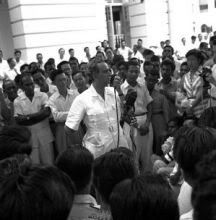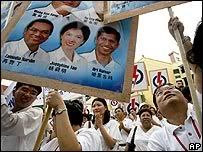Serville Zervant
 On 6th April 1955, Singapore saw its first chief minister equivalent to its prime minister today being elected into parliament (then known as legislative assembly). He was not from the Chinese community who form the majority of the local population. Nor was he a Malay, the largest minority group and indigenous community of Singapore. Nor was he an Indian which is one of the two official minority groups in Singapore. Instead he was from a more pronounced minority group who numbered around 500 then. The people of Singapore then elected a Jew to lead their country.
On 6th April 1955, Singapore saw its first chief minister equivalent to its prime minister today being elected into parliament (then known as legislative assembly). He was not from the Chinese community who form the majority of the local population. Nor was he a Malay, the largest minority group and indigenous community of Singapore. Nor was he an Indian which is one of the two official minority groups in Singapore. Instead he was from a more pronounced minority group who numbered around 500 then. The people of Singapore then elected a Jew to lead their country.
This political party that this Jewish chief minister was affiliated to was the then Labour Front. It did not have a history of parliamentary victories to propel him to his seat. The election of David Marshall, a Jew, was rather not a freak result of the election but the choice of the people. In his short-lived two year government he did not lose favor with his people either. Instead he only resigned due to his failure to win independence for Singapore.
1955 was a time Singapore population lacked the present day affluence. Though literacy was not as high as now, people were well informed as they had a huge variety of print newspapers. The country was still recovering from the post second world war instabilities and uncertainties. The world was changing itself like never before. The empire on which the sun never used to set started falling apart. Even in such a confused and apprehensive environment, the Singapore population was sure about choosing a minority as its leader. On a global scale this was indeed a remarkable achievement since even many civilized western countries had not seen a minority individual being elected as head of state by the electorate then. Only fifty years later are they able to achieve what Singapore achieved in 1955. Even India, the largest democracy, only was able to provide sufficient votes for a non-Indian to be the leader of the government a few years ago.
However fifty three years later, we hear our Singapore prime minister saying a minority PM is not possible today. He is probably right. But then that brings about the question why is Singapore not able to repeat this achievement today. Why is it that in this area where other countries are making giant leaps upwards, we have fallen to where they were fifty years ago?
 One might argue the population then had little wealth and so they were gambling their votes away. Realities cannot be that simple. There were certain proportions of the population who were at poverty line and they were desperate to get out of it. The working class Singaporeans saw the active reconstruction of the post war economies in Europe and Asia and they were keen to see that happen in Singapore. If this is not true, we will never have seen the enthusiasm and high productivity in the then labour force.
One might argue the population then had little wealth and so they were gambling their votes away. Realities cannot be that simple. There were certain proportions of the population who were at poverty line and they were desperate to get out of it. The working class Singaporeans saw the active reconstruction of the post war economies in Europe and Asia and they were keen to see that happen in Singapore. If this is not true, we will never have seen the enthusiasm and high productivity in the then labour force.
Given the large variety of information across a huge number of print media, the population was definitely more informed than the current population. Choice was something they could make confidently. Old photos clearly show large turnouts at any political event of any party which only show the population had great interest for politics also.
Contrasting that to Singapore in 2008, we see today a population that has only one news company to serve their whole domestic information needs. Their interest in politics is pathetic. It is at the most discussed in taxi journeys and coffeeshops. Discussions by some really tiny groups like TOC is a far cry from how it used to be in 1955. Even when a PAP MP speaks at dinners, half the times the crowds are totally not interested at all.
 I have noticed that the average Singaporeans gets depressed when politcal issues are discussed. They are more interested in entertainment, recreation, making more money and buying more products. Even the ruling PAP is having problems finding good candidates. There is probably a slight improvement today from a few years ago but overall the situation dismally is a huge step backwards from 1955. It is about time Singaporeans sit back and reflect what has caused all this deterioration in the last 53 years and seek to rectify the situation. No economic achievement can sustain itself without parallel political achievements.
I have noticed that the average Singaporeans gets depressed when politcal issues are discussed. They are more interested in entertainment, recreation, making more money and buying more products. Even the ruling PAP is having problems finding good candidates. There is probably a slight improvement today from a few years ago but overall the situation dismally is a huge step backwards from 1955. It is about time Singaporeans sit back and reflect what has caused all this deterioration in the last 53 years and seek to rectify the situation. No economic achievement can sustain itself without parallel political achievements.
———-
The writer wishes to remain anonymous for personal reasons.
———-
